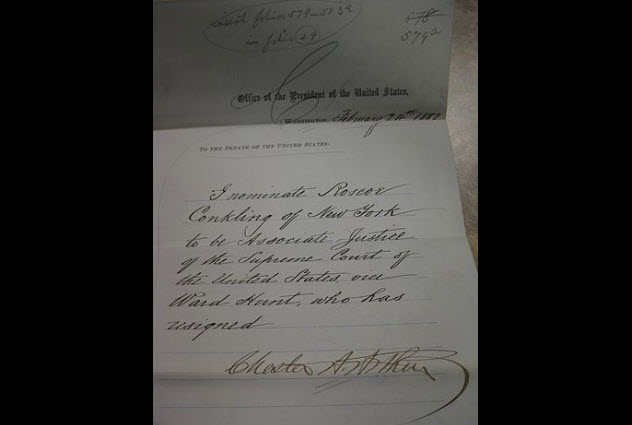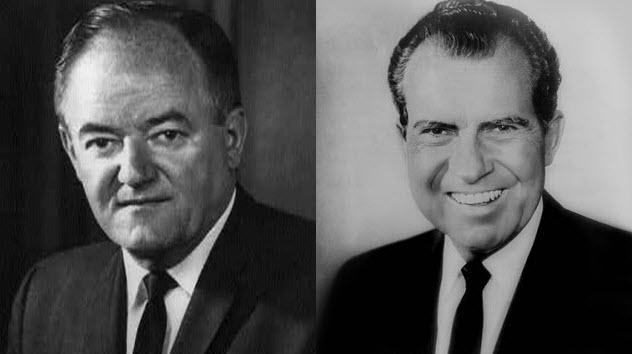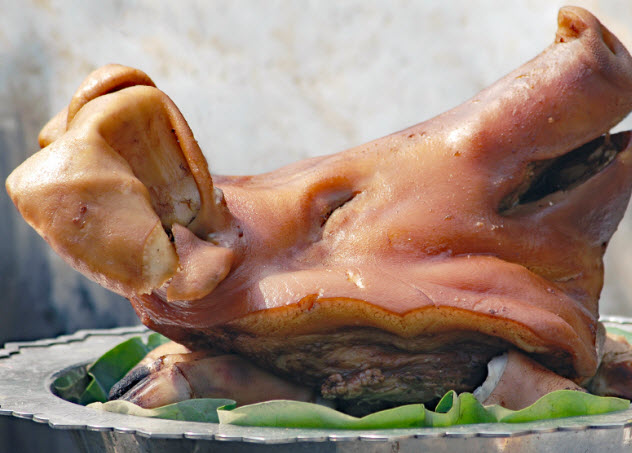 Our World
Our World  Our World
Our World  History
History 10 Historical Figures You Didn’t Know Had Tattoos
 Food
Food 10 Head-Scratching Food Fads That Have (Mostly) Come and Gone
 Movies and TV
Movies and TV 10 Sequels That Simply Repeat the First Film
 Technology
Technology 10 Surprising Stories Made Possible by Cutting-Edge Technology
 Animals
Animals 10 Popular Misconceptions about Dogs
 History
History 10 Unbelievably Badass Women from History
 Music
Music 10 Rock Musicians with Impressive College Degrees
 Misconceptions
Misconceptions 10 Totally Deceptive Marketing Tactics Exposed
 Movies and TV
Movies and TV 10 Amazing Facts About 10 of the Most Popular Television Shows
 Our World
Our World 10 Incredible Discoveries That Were Announced This Year
 History
History 10 Historical Figures You Didn’t Know Had Tattoos
 Food
Food 10 Head-Scratching Food Fads That Have (Mostly) Come and Gone
Who's Behind Listverse?

Jamie Frater
Head Editor
Jamie founded Listverse due to an insatiable desire to share fascinating, obscure, and bizarre facts. He has been a guest speaker on numerous national radio and television stations and is a five time published author.
More About Us Movies and TV
Movies and TV 10 Sequels That Simply Repeat the First Film
 Technology
Technology 10 Surprising Stories Made Possible by Cutting-Edge Technology
 Animals
Animals 10 Popular Misconceptions about Dogs
 History
History 10 Unbelievably Badass Women from History
 Music
Music 10 Rock Musicians with Impressive College Degrees
 Misconceptions
Misconceptions 10 Totally Deceptive Marketing Tactics Exposed
 Movies and TV
Movies and TV 10 Amazing Facts About 10 of the Most Popular Television Shows
10 Hilariously Petty Acts By Politicians And Leaders
Politics is the grandest game in the world. Every day, a few dozen men and women make decisions that will affect millions of lives. It might not always be a noble calling, but there’s no doubting the gravity of the actions that our leaders take.
At least, that’s the case most of the time. Occasionally, the actions taken are less grave and more hilariously petty.
10 Nixon Launched The War On Drugs To Undermine Blacks And Hippies

For many people living today, Nixon is thought of as the worst president of all time. He extended the Vietnam War, costing hundreds of thousands of lives. He once threatened to have a journalist murdered. And then there’s the whole Watergate thing.
Although we’ve previously argued that Tricky Dick had some good points, being magnanimous wasn’t one of them. Nixon was famously petty, keeping a list of “enemies” and getting his boys to dig up as much dirt on them as possible.
But perhaps his pettiest action was launching the “war on drugs.” Rather than developing a program to deal with the real scourge of drug addiction, Nixon approved this “war” purely as a way of undermining black people and hippies.
In 1994, John Ehrlichman, Nixon’s former domestic policy chief, gave a shockingly blunt interview to reporter Dan Baum. He claimed that Nixon was obsessed with two enemies in 1968: the blacks and the antiwar left.
Since they couldn’t make it illegal to be black or left-wing, they did the next best thing. They cooked up the war on drugs specifically to target pot, the hippies’ favorite drug. For good measure, they whipped up public concern about black people and heroin.
At this point, we should mention that Ehrlichman is famously bitter toward his old boss. After all, Ehrlichman went to jail for Watergate. But it’s a well-known fact that Nixon was racist, paranoid, and petty, so making up a war on drugs just to smash his enemies seems entirely in keeping with his character.
9 FDR’s Administration Loved To Mess With Herbert Hoover

Herbert Hoover, the 31st US president, is another leader who isn’t highly regarded by the public. That was as true in his time as it is now. His successor, Franklin D. Roosevelt, thought that Hoover was something of an idiot. Even before taking office, FDR was scuttling Hoover’s legacy by refusing to stand by his administration’s plans to end the Great Depression.
In this case, the differences between the two were ideological, and FDR had the nation’s best interests at heart in rejecting Hoover’s ideas. The same can’t be said for his administration’s approach to the Hoover Dam. In 1933, the FDR White House deliberately issued an order to rename the dam and erase Hoover from the picture.
Only three years earlier, Secretary of the Interior Ray Lyman Wilbur had journeyed to Nevada and announced to the press that the dam, which was still under construction, would be known as the Hoover Dam. Later, FDR’s Secretary of the Interior Harold Ickes renamed it.
The reasons were purely personal. A New Deal man, Ickes hated Hoover and everything for which he stood. When inaugurating the dam, he even made a speech saying that “this great engineering achievement should not carry the name of any living man.” Everyone knew that the remark was directed at Hoover.
Still, Hoover had the last laugh. In 1947, long after FDR had died and Ickes had moved on, Harry S. Truman signed a resolution naming the dam after Hoover again.
8 Clinton’s White House Aides Trashed Everything On Moving Out

Back in 2001, Democrats weren’t happy about turning over the White House to George W. Bush. There was a public perception that Bush had stolen the election and that Democrat Al Gore should have succeeded Clinton.
Accordingly, on their last day at 1600 Pennsylvania Avenue, Clinton’s staffers decided to register their displeasure at the change. They did so by acting like a bunch of irate frat boys.
First, the staffers removed every “W” from White House keyboards, making it impossible to spell the new president’s full name. Voice mails were recorded that disparaged Bush in crude sexual language. Stickers were put up that said “jail to the thief,” a reference to the supposedly stolen election.
When they moved into the White House, the first thing that the Bush administration had to do was clean up $14,000 worth of damage left by Slick Willie’s staff.
In an interesting twist, Clinton later claimed that George H.W. Bush’s staffers had done something similar before he took office in 1993. Nonetheless, the 2001 handover became infamous as the pettiest in modern history.
7 Roscoe Conkling Tried To Damage The Supreme Court Over A Pointless Feud

Although you’ve probably never heard of him, Roscoe Conkling was a mover and shaker in 19th-century American politics. A Republican senator from New York, he controlled who got important jobs at the New York Customs House, which collected federal customs in New York City.
Conkling was also corrupt. Heads of the Customs House were chosen on the basis of whether they were besties with Conkling, merit be damned. When James A. Garfield became the 20th US president, he was determined to clean up Conkling’s rotten Customs House. The two men clashed, and in 1881, Conkling resigned from the US Senate in a fit of pique. He also started to plot his ridiculous revenge.
Fast-forward to fall of that year. Garfield had been assassinated, and Chester A. Arthur became the new president. Attempting to rebuild the bridges that Garfield had burned, Arthur made overtures to Conkling, offering him a position on the US Supreme Court.
Conkling accepted. He was vetted and approved by the Senate. Then, at the last possible second, Conkling refused to serve. He deliberately left the Supreme Court with a gaping hole on its bench and a Republican Party in utter disarray—all because he’d had a falling-out with a man who was now several months dead.
6 Lyndon Johnson Helped Nixon Win The Presidency For Ridiculous Reasons

Politics is a tribal game. If you’re a president nearing the end of your term, you’re supposed to make sure that the person succeeding you comes from the same party. Lyndon B. Johnson apparently didn’t read the rule book. When Democratic nominee Hubert Humphrey suggested that the Vietnam War was pointless, Johnson decided to throw the presidency to the Republicans.
Johnson was something of an egomaniac. Although he had serious misgivings about the war, he felt that those who spoke out against it were essentially traitors and communists.
So when Humphrey made exiting the war a priority, Johnson flew off the handle. He began to spread rumors that Humphrey was an unreliable coward and refused to help him get elected. At one point, Johnson even confided to an aide that he preferred the idea of a Nixon White House.
Things finally came to a head when a Greek journalist who had fled a military coup handed Johnson a chance to destroy Nixon’s campaign and ensure a Democratic White House. The journalist had hard evidence that Nixon was accepting millions of dollars in donations from Greece’s new military dictatorship. Rather than blow the Republican campaign out the water, Johnson simply sat on it.
We all know what happened next. Nixon clobbered Humphrey, leading to eight years of Republican control of the White House. Where Humphrey was concerned, Johnson’s Pyrrhic victory was less cutting off his nose to spite his face and more like chopping off his whole head.
5 Lord Ashcroft Forever Linked David Cameron To A Dead Pig

In 2015, protest marches against David Cameron’s UK Conservative Party began to feature many people dressed in pig masks. The reason for this had nothing to do with slurs about the police. Instead, it had to do with a rich man known as Lord Ashcroft.
A former Conservative Party donor, the millionaire Ashcroft helped to get David Cameron elected in 2010 by throwing as much money at him as possible. Ashcroft already had a seat in the House of Lords but believed that his support of Cameron entitled him to a senior government position, probably foreign secretary.
When Cameron offered Ashcroft a junior role, he angrily refused. Then he spent the next few years writing a “biography” of Cameron to insinuate that the British prime minister had once had sex with a dead pig’s severed head.
The claim was almost certainly false, possibly libelous, and seemingly stolen from a similar tactic once used by Lyndon Johnson. It was also the sort of insult that a fifth grader would be ashamed to use. But it worked. Cameron is now the only prime minister in UK history that some believe defiled a pig.
4 Montgomery C. Meigs Turned Robert E. Lee’s House Into A Union Graveyard

Civil wars are bitter, and the US Civil War was no exception. When Robert E. Lee went over to the Confederacy, his former army buddies reacted with ferocious venom. They called for him to be executed and his property to be confiscated.
Brigadier General Montgomery C. Meigs, who had served happily under Lee a few years earlier, decided to take a different tack. Figuring that he couldn’t get Lee himself, Meigs went after the next best thing: Lee’s beloved home in Arlington, Virginia.
But rather than burn it to the ground, Meigs had something funnier in mind. He convinced the army leadership to let him turn the massive property into a graveyard for Union soldiers.
There’s no doubt that he did this specifically as revenge against his old commanding officer. Meigs had Mary Lee’s garden dug up and filled with dead patriots.
When Union officers refused to let him bury corpses right beside the house, Meigs threw a temper tantrum. He installed chaplains, built churches, erected sarcophagi, and generally did everything in his power to ensure that the Lees could not live there after the war.
Meigs certainly knew his stuff. When the war ended, Lee considered Arlington too much of a hot potato to touch. When he died and Mary took over the case, she was publicly shamed on the Senate floor.
Although one of Lee’s descendants eventually won the right to sell Arlington back to the government, Meigs’s desire to never see another Lee living in Arlington was fulfilled.
3 Parris Glendening Shut Off A Memorial Fountain To Annoy A Rival

Former Baltimore mayor William Donald Schaefer was the kind of guy who liked to stick his oar in. As comptroller of Maryland, he went out of his way to block Governor Parris Glendening’s plans for the state—for no other reason than that he disliked the guy. What Schaefer couldn’t have known was that Glendening was about to school his comptroller in petty revenge.
A few years earlier, Schaefer’s longtime companion, Hilda Mae Snoops, had had a bronze fountain installed outside the governor’s mansion. After she died, Schaefer began spending all of his time there as a way of honoring her memory.
Friends said that he used to love the fountain like a real person. So when his interference with Glendening’s program became too much for the governor to bear, Glendening did the mature thing and had Schaefer’s beloved fountain permanently shut off.
Schaefer lost it big time. The official reason for shutting off the fountain was a water shortage, but the fountain was a closed system that only required 4 liters (1 gal) of water to operate continuously.
Schaefer even bought a gallon of water for Glendening to convince him to turn the fountain back on. But it was to no avail. When the Board of Public Works convened, Schaefer wasted entire meetings begging everyone to restart his fountain.
Eventually, the fountain was restarted during a televised ceremony. But not before Glendening had shown his rival who was the boss of petty revenge.
2 The Middle East Deliberately Crashed Western Economies
On October 6, 1973, Egypt, Syria, and Jordan made the unwise decision to attack Israel. The resulting Yom Kippur War lasted a mere 20 days and ended with the Arab states losing badly.
But their grievances didn’t end with the war. Annoyed that the US had helped Israel, the Arab states decided to get back at the West in a different way. They deliberately engineered an oil price shock that crippled Western economies.
The effects of this temper tantrum were devastating. The price of crude soared from $3 to $12 per barrel almost overnight. In Britain, inflation hit 24 percent, leading the unions to demand insane pay raises. In turn, this caused massive strikes, a three-day workweek, and the collapse of Ted Heath’s Conservative government.
In the US, the New York Stock Exchange collapsed, ushering in one of the worst recessions on record. The auto industry was also crippled.
In the end, the oil embargo caused a lot of pain but almost no gain. Not one pro-Israel country shifted to a pro-Arab position as a result. Nor did it change the outcome of the Yom Kippur War.
1 Genghis Khan Killed Everyone And Their Cats And Dogs Over A Minor Slight

Genghis Khan is known today as one of history’s most feared conquerors. But back in the 13th century, he was just another guy with an army. So when he sent out a caravan to establish a trade route with Khwarezmia, an ancient Central Asian empire, nobody in charge thought anything of attacking the caravan and killing its occupants.
Big mistake. The khan did everything larger than life, including petty revenge. When news of the caravan’s fate reached him, he calmly saddled up and proceeded to lay waste to all of Khwarezmia.
This total devastation took three years. Men, women, children, and the elderly were all killed. Unborn babies were ripped out of pregnant women and killed for good measure.
In the city of Nishapur, orders were given to execute all the inhabitants, all their livestock, and every cat and dog that the Mongol warriors could find. Not a single animal was left alive. By the end of 36 months, there was no longer a Khwarezmia Empire.
Surprisingly, the khan had never wanted a war. He’d simply hoped to open up trade with his neighbors—with maybe some light pillaging thrown in for good measure. Instead, he wound up destroying everyone with whom he could possibly trade in a 1,600-kilometer (1,000 mi) radius.








